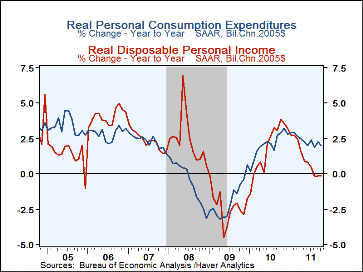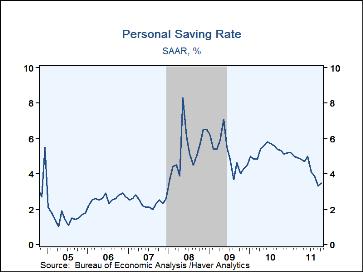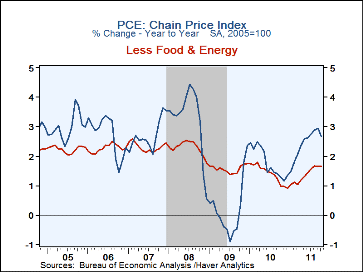 Global| Nov 23 2011
Global| Nov 23 2011U.S. Personal Savings Remain Low With Income Growth
by:Tom Moeller
|in:Economy in Brief
Summary
Individuals continue to rely on savings rather than income to support spending. The personal savings rate remained depressed at 3.5%. However, September was revised down to 3.3%, from 3.5% reported last month, and the savings rate [...]
 Individuals continue to rely on savings rather than income to support
spending. The personal savings rate remained depressed at 3.5%.
However, September was revised down to 3.3%, from 3.5% reported last
month, and the savings rate remained down from the 8.3% monthly peak
reached in 2008. Disposable personal income rose 0.3% last month
following changes between plus-or-minus 0.1% during the prior five months.
Recent growth was worse when adjusted for prices. Though real take-home
pay rose 0.3% last month, income has fallen at a 0.5% annual rate since
December. Personal consumption expenditures ticked up 0.1%
in October following a 0.7% jump. In real terms, spending also rose 0.1%.
Despite weakened income, consumers raised spending 1.8% (AR) this year.
Individuals continue to rely on savings rather than income to support
spending. The personal savings rate remained depressed at 3.5%.
However, September was revised down to 3.3%, from 3.5% reported last
month, and the savings rate remained down from the 8.3% monthly peak
reached in 2008. Disposable personal income rose 0.3% last month
following changes between plus-or-minus 0.1% during the prior five months.
Recent growth was worse when adjusted for prices. Though real take-home
pay rose 0.3% last month, income has fallen at a 0.5% annual rate since
December. Personal consumption expenditures ticked up 0.1%
in October following a 0.7% jump. In real terms, spending also rose 0.1%.
Despite weakened income, consumers raised spending 1.8% (AR) this year.
Overall personal income rose 0.4% last month following an unrevised 0.1% September uptick. A 0.3% increase had been expected. Wage & salary disbursements rose 0.5% (3.2% y/y) while proprietors' income fell 0.3% (3.4% y/y). Rental income was far stronger and rose 0.8% (17.0% y/y). Interest income rose 0.6% (0.8% y/y) following three months of decline and dividend income rose 0.3% (7.2% y/y).
The 0.1% October gain in personal consumption expenditures was short of expectations for a 0.4% rise. That followed an unrevised 0.6% September increase. Spending on durable goods rose 0.1% (6.8% y/y) following the 1.6% September gain. Outlays on motor vehicles were unchanged (4.5% y/y) after the incentive driven, 8.3% jump during September. Spending on furniture increased 0.4% (5.3% y/y) but apparel slipped 0.2% (+4.9% y/y). Spending on gasoline fell 3.9% (+16.6% y/y) but when adjusted for prices spending was off a lesser 1.1% (-5.6% y/y). Services spending rose 0.1% (3.6% y/y), paced by a 7.1% y/y increase in food services & accommodations and a 4.5% y/y increase in health care services.
The PCE chain price index slipped 0.1% last month (2.9% y/y) paced by a 2.7% drop (+23.5%) drop in gasoline prices. The core PCE price deflator rose marginally m/m (+1.7% y/y). The annual increase was up from the record-low 12-month change of 0.9% reached last December. Notable amongst the categories was a 5.1% y/y gain in food services, a 3.7% y/y rise in clothing prices but a 7.1% decline in recreational goods.
The personal income & consumption figures are available in Haver's USECON and USNA databases. The expectations figures are in the AS1REPNA database.
| Personal Income
& Outlays (%) |
Oct | Sep | Aug | Y/Y | 2010 | 2009 | 2008 |
|---|---|---|---|---|---|---|---|
| Personal Income | 0.4 | 0.1 | -0.1 | 3.9 | 3.7 | -4.3 | 4.6 |
| Wages & Salaries | 0.5 | 0.4 | -0.1 | 3.2 | 2.2 | -4.3 | 2.0 |
| Disposable Personal Income |
0.3 | 0.1 | -0.1 | 2.5 | 3.6 | -2.1 | 5.8 |
| Personal Consumption Expenditures |
0.1 | 0.7 | 0.2 | 4.7 | 3.8 | -1.7 | 2.7 |
| Saving Rate | 3.5 | 3.3 | 3.9 | 5.3 (Oct'10) |
5.3 | 5.1 | 5.4 |
| PCE Chain Price Index | -0.1 | 0.2 | 0.3 | 2.7 | 1.8 | 0.2 | 3.3 |
| Less Food & Energy | 0.1 | 0.0 | 0.2 | 1.7 | 1.4 | 1.6 | 2.3 |
| Real Disposable Income |
0.3 | -0.1 | -0.4 | -0.1 | 1.8 | -2.3 | 2.4 |
| Real Personal Consumption Expenditures |
0.1 | 0.5 | -0.1 | 2.0 | 2.0 | -1.9 | -0.6 |
Tom Moeller
AuthorMore in Author Profile »Prior to joining Haver Analytics in 2000, Mr. Moeller worked as the Economist at Chancellor Capital Management from 1985 to 1999. There, he developed comprehensive economic forecasts and interpreted economic data for equity and fixed income portfolio managers. Also at Chancellor, Mr. Moeller worked as an equity analyst and was responsible for researching and rating companies in the economically sensitive automobile and housing industries for investment in Chancellor’s equity portfolio. Prior to joining Chancellor, Mr. Moeller was an Economist at Citibank from 1979 to 1984. He also analyzed pricing behavior in the metals industry for the Council on Wage and Price Stability in Washington, D.C. In 1999, Mr. Moeller received the award for most accurate forecast from the Forecasters' Club of New York. From 1990 to 1992 he was President of the New York Association for Business Economists. Mr. Moeller earned an M.B.A. in Finance from Fordham University, where he graduated in 1987. He holds a Bachelor of Arts in Economics from George Washington University.
More Economy in Brief
 Global| Feb 05 2026
Global| Feb 05 2026Charts of the Week: Balanced Policy, Resilient Data and AI Narratives
by:Andrew Cates








